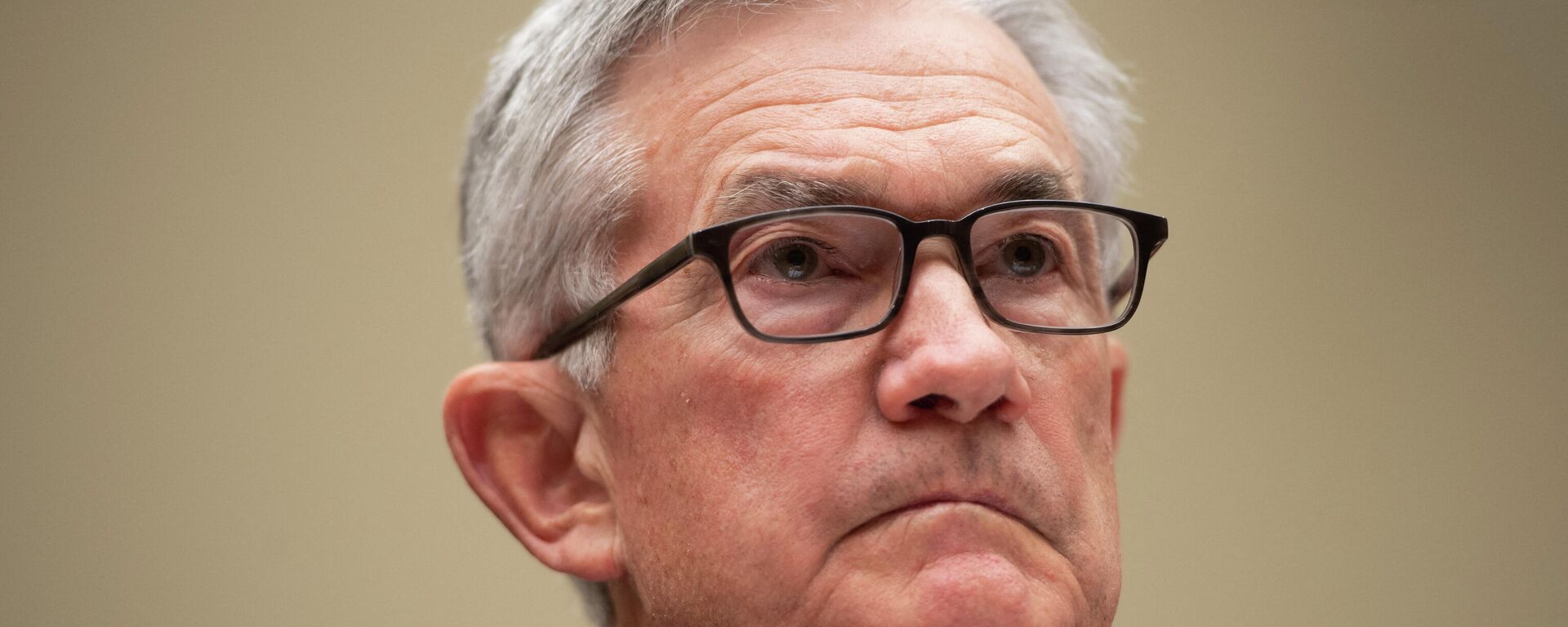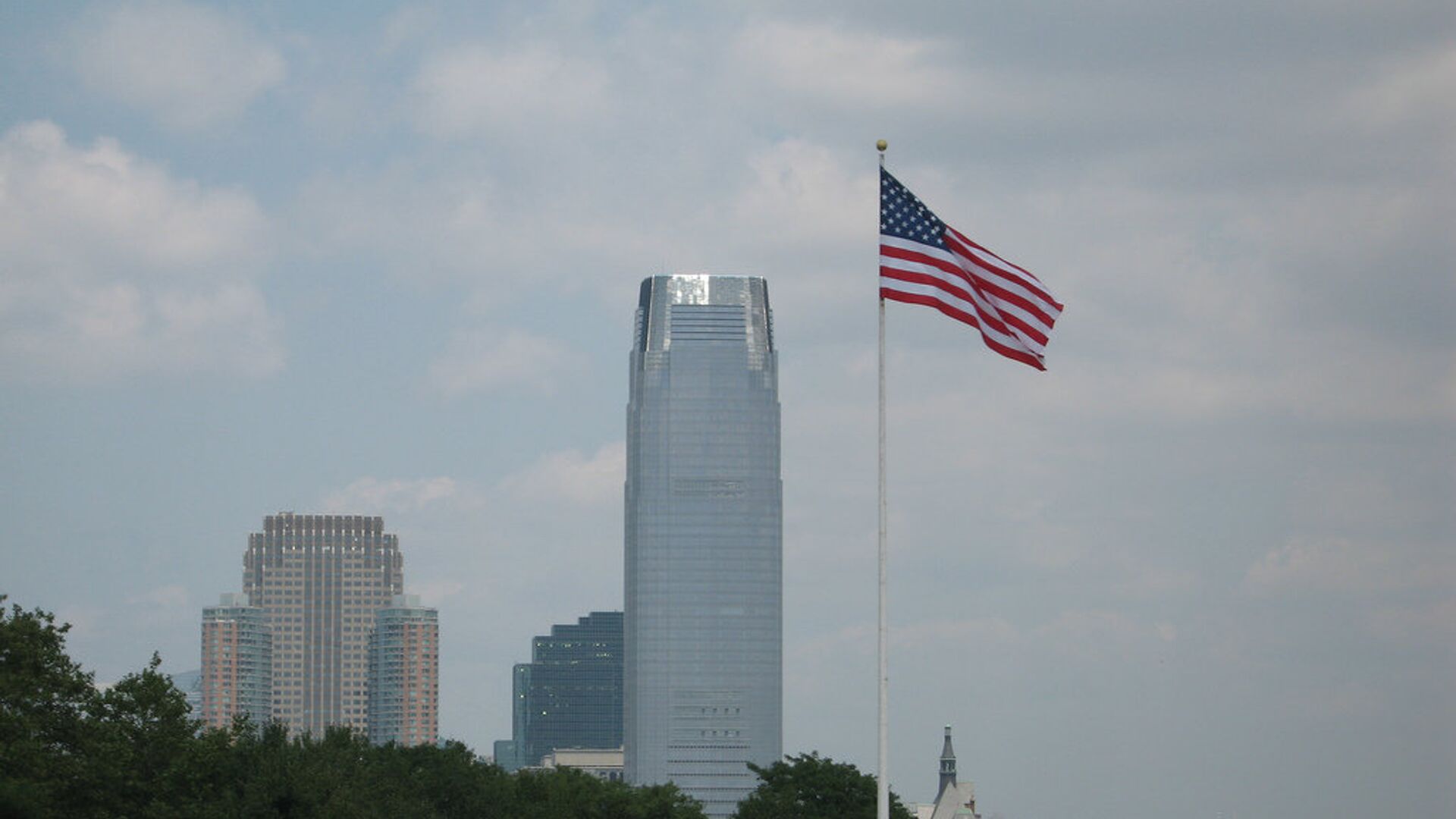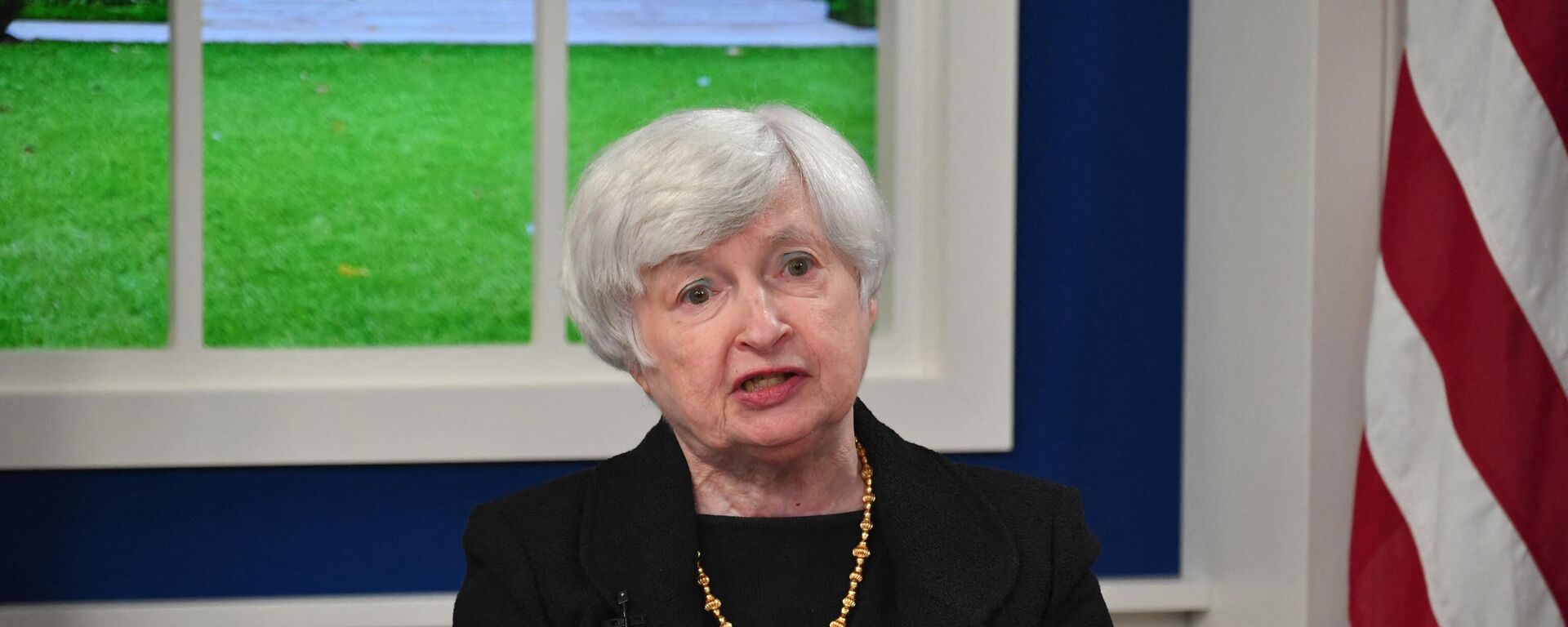https://sputnikglobe.com/20230906/goldman-sachs-grows-confident-us-will-avoid-recession-next-year-1113142578.html
Goldman Sachs Grows Confident US Will Avoid Recession Next Year
Goldman Sachs Grows Confident US Will Avoid Recession Next Year
Sputnik International
Wall Street giant Goldman Sachs said in a recent report that the bank only gives a 15% chance of a recession in the US in the next 12 months.
2023-09-06T03:08+0000
2023-09-06T03:08+0000
2023-09-06T03:07+0000
economy
goldman sachs
us federal reserve
us treasury
americans
recession
economic recession
https://cdn1.img.sputnikglobe.com/img/103807/66/1038076667_0:30:1024:606_1920x0_80_0_0_b100aa946a570bc4d12883f32d196829.jpg
US financial giant Goldman Sachs’ confidence that a recession for the American economy will not happen is growing, a new note by the investment firm has revealed.The Monday-published note, titled “Soft Landing Summer,” stated the Wall Street bank now gives a 15% chance that the United States will enter a recession over the next 12 months, marking a significant decrease from their March prediction of 35% following the collapse of multiple mid-sized banks.Many economists - some of whom continue to do so - warned that increased interest rates from the US Federal Reserve could steer the economy into a recession. However, job numbers remain strong and inflation has slowed significantly compared to last year.The Goldman Sachs report said it is also growing in confidence that the Fed is done raising interest rates, and indicated the central bank may have threaded the needle perfectly.He added in the report that the Fed’s GPDNow forecasting model prediction of 5.6% growth in the third quarter of 2023 likely overstates the economy’s momentum. The report predicts that as the student loan payment resumption and increased mortgage rates ripple through the economy, a slowdown will occur but he says it is likely to be short-lived and shallow.Unemployment numbers also rose in August, from 3.5% to 3.8% typically an indicator of a weakening economy, but the report says that is largely due to more people looking for work rather than people losing jobs.Meanwhile, Wall Street’s most talked about recession indicator, the inverted yield curve, is still predicting a recession is looming.The inverted yield curve has correctly predicted every US recession since 1955. It deals with the return yield on 3-month and 10-year US Treasury bonds. When the 3-month Treasury bonds give better returns than the 10-year bonds, that is called an inverted yield.In May, the 3-month bond was outperforming the 10-yield bond by 2 points, but that has since narrowed to 1 point, a development known as a re-steepening. Since at least 1955, re-steepening events have always coincided with or preceded a recession.The last four recessions occurred shortly after a re-steepening event, indicating that one could still be around the corner, but other economic indicators remain positive, hinting the inverted yield curve may be wrong for the first time.That could be because the economy was so upended by the pandemic and geopolitical tensions affecting global trade, particularly between the US and China, that previously reliable economic indicators are no longer useful.However, the lived experience of Americans paints a darker picture of the economy. A recent poll of 1,500 registered voters stated that only 36% of voters believe the economy is either “excellent” or “good” compared to 63% who rated it as either “not so good” or “poor.” The cost of housing (86%) and inflation (74%) were the most common concerns.Concerning things that could actually change the minds of Americans on the economy, rather than arcane economic charts, the Goldman Sachs report had some good news on that front. Hatzius predicts real wages, that is wages with inflation factored in, will rise over the coming months.
https://sputnikglobe.com/20230425/yellen-warns-us-debt-default-risks-mass-unemployment-broad-economic-weakness-1109832077.html
https://sputnikglobe.com/20230825/federal-reserve-to-keep-hiking-interest-rates-as-us-economy-not-cooling---chairman-1112893650.html
Sputnik International
feedback@sputniknews.com
+74956456601
MIA „Rossiya Segodnya“
2023
News
en_EN
Sputnik International
feedback@sputniknews.com
+74956456601
MIA „Rossiya Segodnya“
Sputnik International
feedback@sputniknews.com
+74956456601
MIA „Rossiya Segodnya“
recession, us economy, will there be a recession, recession predictions, economic predictions
recession, us economy, will there be a recession, recession predictions, economic predictions
Goldman Sachs Grows Confident US Will Avoid Recession Next Year
After record breaking inflation and several bank failures, many economists predicted the United States was headed toward a recession; however, that trend has started to reverse. Last week, the Federal Reserve’s staff forecasted the economic downturn was unlikely.
US financial giant Goldman Sachs’ confidence that a recession for the American economy will not happen is growing, a new note by the investment firm has revealed.
The Monday-published note, titled “Soft Landing Summer,” stated the Wall Street bank now gives a 15% chance that the United States will enter a recession over the next 12 months, marking a significant decrease from their March prediction of 35% following the
collapse of
multiple mid-sized banks.
Many economists - some of whom continue to do so - warned that increased interest rates from the US Federal Reserve could steer the economy into a recession. However, job numbers remain strong and inflation has slowed significantly compared to last year.
The Goldman Sachs report said it is also growing in confidence that the Fed is done raising interest rates, and indicated the central bank may have threaded the needle perfectly.
“We strongly disagree with the notion that a growing drag from the ‘long and variable lags’ of monetary policy will push the economy toward recession,” Jan Hatzius, chief US economist for Goldman Sachs, wrote. “In fact, we think the drag from monetary policy tightening will continue to diminish before vanishing entirely by early 2024.”
He added in the report that the Fed’s GPDNow forecasting model prediction of 5.6% growth in the third quarter of 2023 likely overstates the economy’s momentum. The report predicts that as the student loan payment resumption and increased mortgage rates ripple through the economy, a slowdown will occur but he says it is likely to be short-lived and shallow.
Unemployment numbers also rose in August, from 3.5% to 3.8% typically an indicator of a weakening economy, but the report says that is largely due to more people looking for work rather than people losing jobs.
Meanwhile, Wall Street’s most talked about recession indicator, the inverted yield curve, is still predicting a recession is looming.
The inverted yield curve has correctly predicted every US recession since 1955. It deals with the return yield on 3-month and 10-year US Treasury bonds. When the 3-month Treasury bonds give better returns than the 10-year bonds, that is called an inverted yield.
In May, the 3-month bond was outperforming the 10-yield bond by 2 points, but that has since narrowed to 1 point, a development known as a re-steepening. Since at least 1955, re-steepening events have always coincided with or preceded a recession.
The last four recessions occurred shortly after a re-steepening event, indicating that one could still be around the corner, but other economic indicators remain positive, hinting the inverted yield curve may be wrong for the first time.

25 August 2023, 17:21 GMT
That could be because the economy was so upended by the pandemic and geopolitical tensions affecting global trade, particularly between the US and China, that previously reliable economic indicators are no longer useful.
However, the lived experience of Americans paints a darker picture of the economy. A
recent poll of 1,500 registered voters stated that only 36% of voters believe the economy is either “excellent” or “good” compared to 63% who rated it as either “not so good” or “poor.” The cost of housing (86%) and inflation (74%) were the most common concerns.
Concerning things that could actually change the minds of Americans on the economy, rather than arcane economic charts, the Goldman Sachs report had some good news on that front. Hatzius predicts real wages, that is wages with inflation factored in, will rise over the coming months.




